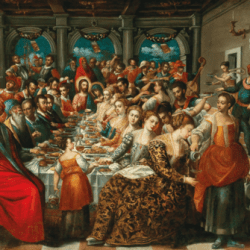Got an e-mail reminder that registration is still open for the Catholic Writers Guild’s online conference this coming weekend. If you are an aspiring Catholic writer, you should give serious thought to attending this conference.
(FYI: I forget what the clergy & religious rate is, but it’s generally *very favorable* so follow the instructions to inquire. If you qualify for it, you’ll very much like the discount.)
My experience with the CWCO:
I showed up for my first online conference with the CWG as someone who had always enjoyed writing, was the go-to person for office writing jobs, and at the time I’d just started blogging anonymously as a first foray into writing for a public audience. My first conference did two things for me:
- I learned about the publishing industry and what, as a writer, I needed to do in order to be published.
- I took several writing workshops that radically improved the skill level of my craft.
I came into the conference as someone who loved to write and who had plenty of practice writing, but whose formal training had ended at the level of English 101. So the conference was my entry course in professional writing, for both fiction and non-fiction. It was absolutely invaluable.
The other thing the conference did was introduce me to the Catholic Writers Guild.
Is the CWG for you?
As someone with no connections in the publishing world and no experience* or training in professional writing, the Catholic Writers Guild was the thing, the one thing, the life-changing thing that eventually led to my getting published.
However, let me caution you: Just joining doesn’t do the magic. You’ll benefit from the guild if you get actively involved volunteering. I met people across the industry while volunteering to work at the CWG’s conferences. I gained experience by taking on projects within the day-to-day operations of the guild. Through the process of doing that work — and it is work — I built relationships with other writers who shared my interests.
If you’re already a pro and you already have a path laid out for you in publishing the kinds of works you want to publish, then you probably don’t need the CWG. You might enjoy it, but professionally it’s not going to be your sole lifeline. In contrast, if you’re new to the writing industry, and especially if you are new to Catholic publishing and don’t know where to begin in accomplishing your goals, the CWG can absolutely help you succeed as a Catholic writer.
Is there a market for Catholic fiction and non-fiction?
Let me be clear: Catholic publishers are always looking for good writers with good material. It’s a question of developing your craft (which the conference can definitely help you do) and getting connected with the types of publishers who are interested in the kind of writing that you do.
Your perfectly-matched publisher may or may not be present at this year’s conference, but the people you meet at the conference and through volunteering with the CWG can help you get connected.
My experience with CWG pitch sessions:
I volunteered at the online and (when possible) in-person conferences for several years, which let me become familiar with how pitch sessions worked before I was myself ready to pitch a book. I will tell you that as a volunteer doing behind-the-scenes conference work, acquisitions editors who met me habitually asked if I didn’t have something of interest — I didn’t. But they will ask if you seem like a smart, friendly, polite person, because editors are highly motivated to bring in good books, and they will sniff them out aggressively. Eventually I had something to sell.
I pitched Classroom Management for Catechists to Our Sunday Visitor at one of the CWG online conferences. They were interested. I sent in a proposal, and if I recall correctly the acquisitions editor took a look and made a case for it to his committee at OSV. The book didn’t fit with what they were looking for that year (trust publishers on this — they know their business), so I didn’t end up with a contract. A friend from the guild recommended I reach out to Liguori next (she had written for them), and that turned out to be an ideal fit. I did significant re-writing, by the way; one of the things editors do is look at your proposal and tell you how to change it to make it what their readers need.
Once you’ve proven that you can deliver a well-written book and that you aren’t a complete nightmare to work with, editors who know you will start fishing for proposals. OSV is a regular at CWG conferences, but The How-to Book of Evangelization was actually a brainstormed project idea with an editor then at OSV who’d worked with me in the past on smaller projects (some of them unpaid for me — excellent apprenticeship experience, and sometimes a necessary step for someone with no prior experience in the profession, and which in turn led to paying work).
So I didn’t use the conference pitching process for my second book, but I did draw on the same basic skills. I would view pitching at conferences as an opportunity to make some initial connections, but it’s just a beginning. It’s normal for book-matchmaking to involve testing the waters, getting feedback, and refining your ideas.
Even though OSV didn’t end up publishing the first book I pitched to them, their interest gave me confidence and direction for where to shop my proposal next, and it established the beginning of a positive working relationship. Since OSV is one of the publishers hearing pitches at this year’s online conference, I’ll just go ahead and tell you: The editors I worked with all the way through the publishing process for The How-To were top notch. I’d happily work with them again if I had a suitable book to propose.
In conclusion . . .
- If you’re a new or aspiring Catholic writer, I recommend the CWG’s online conference workshops.
- If you need to reboot your career, you are moving into a new genre, or you just want some company with other Catholic writers, take a look at the workshops and see what you think. (Having looked over the schedule, if I physically *can* attend, then yes, I’m going. We’ll see.)
- If you want to get published in Catholic fiction or non-fiction and you don’t know where to begin, I recommend joining and volunteering with the Catholic Writers Guild as your first apprenticeship.
- If you’re not sure, click around on the various conference details and see if it looks like your thing.
There’s nothing magic about the Catholic Writers Guild, but if it’s what you need and you’re able to put in the work, it is absolutely the organization equipped to help you become a published Catholic author.
*Um: I’d written a few very nice drafts of instruction manuals explaining to my colleagues how to use our in-house accounting software? And my thesis advisors were pleasantly surprised that my research on a narrowly-defined aspect of the GATT negotiations was so eminently readable. So I mean, yeah, obviously I had genius talent. And an absolutely riveting portfolio, yes?













